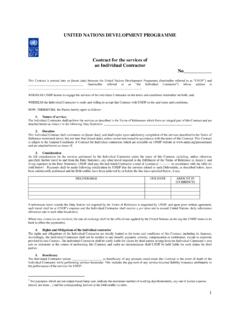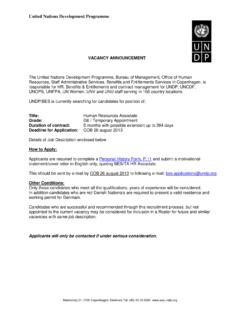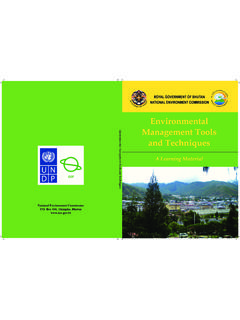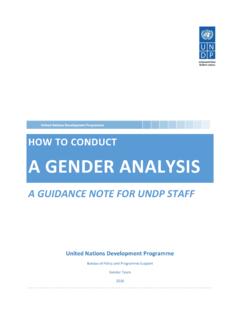Transcription of Up-scaling of climate smart agriculture in Swaziland
1 climate smart agriculture Up scaling in Swaziland 1 Up-scaling of climate smart agriculture in Swaziland Including Pilot of Up-scaling conservation agriculture , Water Efficient Irrigation Technologies and High value crops marketing For Nhletsheni, Nkhungwini and Mpatheni Schemes Submitted to: The Secretariat for Common Market for East and Central Africa (COMESA) By: The Ministry of agriculture The Kingdom of Swaziland Contact: Principal Secretary, Ministry of agriculture . Email: climate smart agriculture Up scaling in Swaziland 2 Contents Introduction .. 4 Project description .. 6 Project justification .. 6 6 Key Deliverables from Project.
2 6 Project Activities: .. 7 Targeted Farmers .. 10 Institutional Capacity .. 10 Project Management, Monitoring and Evaluation .. 11 Auditing .. 11 Sustainability .. 12 Budget .. 12 climate smart agriculture Up scaling in Swaziland 3 List of Acronyms CA Conservation agriculture COMESA Common Market for Eastern and Southern Africa CSA climate smart agriculture MoA Ministry of agriculture NAMB oard National agricultural Marketing Board ToT Training of Trainers UNDP United Nations development programme climate smart agriculture Up scaling in Swaziland 4 Introduction Swaziland , as most parts of the World has been adversely affected by the negative impacts of climate change, which brings a lot of uncertainty especially in the field of agriculture .
3 Over the years, this has resulted in reduced crop production, and to an extent is also affecting the livestock sector in the country. Most farmers are dependent on rainfall for crop production and are therefore vulnerable to reduced rainfall and accompanying moisture stress on the main crop which is maize, and this has seen the country experiencing food shortage for at least the past 11 years, increasing reliance on food assistance for survival and to meet daily food requirements. To mitigate the effects of climate change and improve viability of the agriculture sector, especially crop production, the Government of Swaziland together with non state partners has initiated a number of interventions.
4 Some of these include the construction of irrigation infrastructure in the form of dams and downstream development for crop and livestock production, and introduction of conservation agriculture which aims to reduce soil moisture loss and increase production using minimal tillage methods. One of the climate smart initiatives introduced and promoted vigorously by the Government and other stakeholders is conservation agriculture (CA). This has been practiced in the country for over 10 years, with the use of champion farmers, demonstrations and continuous extension contact training for farmers in all four regions of the country.
5 However, most of the training and practice has been on manual / hand-operated implements such as jab planter and hoe, this is against a back-drop of an agricultural system that has embraced mechanisation, with Government led tractor system in place. Whilst all initiatives have successfully promoted CA, there is a need to mechanise it, which will increase its attractiveness to a broader spectrum of farmers and thrust it into the commercial front. Furthermore, to reduce the impact of climate change in agricultural production, the Government and partners have invested over E20 million (US$2 million) in developing three irrigation schemes namely; Mphatheni, Nhlentjeni and Nkhungwini to improve the quality of life for rural households and communities.
6 These are in addition to other water harvesting initiatives such as small earth dams which are developed in the dry regions of the country to improve access to water for agriculture and other activities. These initiatives strive to achieve improved resilience of smallholder farmers to the impacts of climate change and strengthen marketing system for agriculture production in order to achieve sustainable food security. However, even with the initial investment the schemes were found to be running on 20% or less capacity, meaning that with further quality investment the schemes could become more economically viable and contribute to the livelihoods of the people, whilst also stimulating the rural economy.
7 The irrigation infrastructure itself (use of basic furrow irrigation) has been cited as having very low water use efficiency thus a lot of water is lost to evaporation and seepage. climate smart agriculture Up scaling in Swaziland 5 This proposal seeks funding from COMESA to enable the country to develop a climate smart agricultural intervention that will serve as a blue print for development in this area, and to strengthen the practicality of the model, a pilot project on climate smart agriculture will be implemented in Mpatheni, Nhletjeni and Nkhungwini areas, which are in close proximity, and have a combined hectarage of over 130 hectares of land, with over 200 households directly involved in vegetable production.
8 The main actions to be undertaken include; a. Conducting a baseline survey in the four regions of Swaziland to establish and further, cost sustainable and integrated farming models that will enhance climate smart agricultural interventions. This will be used as a blueprint for the Government, donors and other development partners for future interventions. Whilst the project will be confined to three sites, the study will be countrywide to ensure that the different agro-climatic zones are well researched and options provided for agricultural production in a changing climate b. Implementing a Pilot Project (Mpatheni, Nhletjeni, Nkhungwini), which will be based on up scaling existing climate smart initiatives, with conservation agriculture being the main target.
9 Up scaling conservation agriculture (CA) will mainly involve provision of tractor drawn implements such as a boom sprayer and mechanical planters / rippers. This is a bid to commercialise conservation agriculture for households to firstly attain food security and sell the rest, use of mechanical equipment will also increase efficiency, reducing time spent on land preparation and weeding, which time will be able to be used for other income generating initiatives. c. Pilot conversation of existing high water-use irrigation technology and infrastructure to more water efficient technology in the form of drip irrigation system.
10 Of the total area, 10 ha (about 20%) from each of the three schemes will be fitted with drip irrigation systems, and planted to high value crops, which will in turn be linked to a reliable well researched market so as to ensure that income generated is meaningful and sustainable. The National agricultural Marketing Board will be responsible for scheduling the production based on market demand, and will work with the farmers for training in different production and marketing requirements. The main markets will be derived from already established markets in Swaziland and internationally so that production is streamlined with what the market requires both in terms of quality and volumes.



















